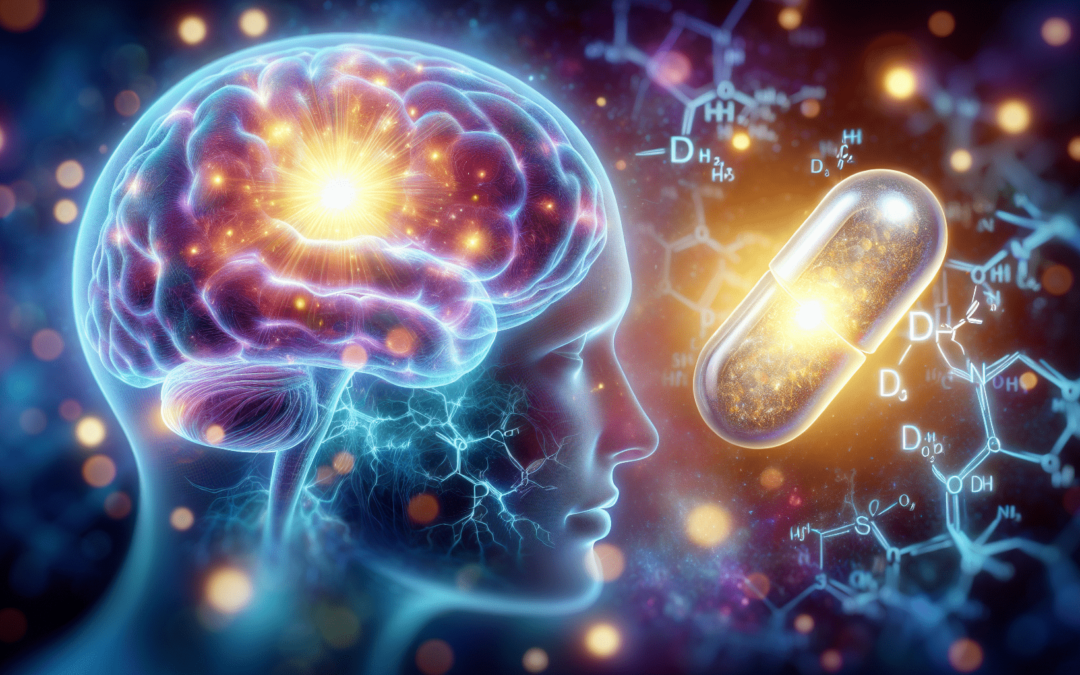Have you ever wondered if the sun itself could be holding the secret to better brain health? Vitamin D3, often referred to as the “sunshine vitamin,” is not just about keeping your bones healthy. It’s a powerhouse when it comes to supporting brain function, mood regulation, and overall cognitive health. Let’s take a closer look at how Vitamin D3 works its invisible magic on your brain.
Understanding Vitamin D3: The Basics
Vitamin D3, also known as cholecalciferol, is a fat-soluble vitamin that your body produces when your skin is exposed to sunlight. Unlike other vitamins, it acts more like a hormone because of its complex interaction with various functions in your body. Specifically, it plays a crucial role in regulating calcium and phosphate levels, which are vital for maintaining healthy bones, teeth, and muscles.
How You Get Vitamin D3
You can obtain Vitamin D3 through various sources. Primarily, your skin synthesizes it when exposed to ultraviolet B (UVB) rays from the sun. However, factors like your location, skin pigmentation, and sunscreen use can impede this natural process. That’s why dietary supplements and Vitamin D-rich foods like fatty fish, egg yolks, and fortified foods become essential.
Why D3 and Not D2?
You might have noticed there are two types of Vitamin D: D2 (ergocalciferol) and D3 (cholecalciferol). Both forms are beneficial, but research indicates that D3 is more effective at raising your Vitamin D levels and is more stable in your bloodstream.
Vitamin D3 and Brain Health: The Connection
Your brain is a complex organ that relies on various substances to function optimally, and Vitamin D3 stands out as a critical player. It enters your brain cells and binds to Vitamin D receptors, thereby influencing the activity of genes involved in brain function.
Mood Regulation
One of the most notable benefits of Vitamin D3 is its impact on mood regulation. Studies have consistently shown a correlation between low levels of Vitamin D3 and mood disorders such as depression and anxiety. This makes sense given that Vitamin D3 facilitates the synthesis of serotonin, a neurotransmitter often called the “feel-good” chemical.
Cognitive Function
Vitamin D3 may also play a role in maintaining cognitive function as you age. Research has shown that individuals with higher levels of Vitamin D3 perform better on memory tests and exhibit a lower risk of developing cognitive decline and dementia. Your brain relies heavily on proper signaling pathways to carry out functions such as learning, memory, and problem-solving. Vitamin D3 aids this process by protecting neurons and promoting the growth of new neural pathways.
Neuroprotection
Vitamin D3 exhibits neuroprotective properties, meaning it can help shield your brain from potential damage. This is particularly crucial in protecting against neurodegenerative diseases like Alzheimer’s and Parkinson’s. By reducing oxidative stress and inflammation in brain cells, Vitamin D3 can help mitigate the risk of these devastating conditions.

Vitamin D3 Deficiency: A Hidden Epidemic
A startling number of people worldwide suffer from Vitamin D3 deficiency, often without realizing it. Various factors contribute to this, including limited exposure to sunlight, poor dietary intake, and certain medical conditions.
Symptoms and Risks
The symptoms of Vitamin D3 deficiency can be subtle and are often attributed to other causes. Common signs include fatigue, muscle weakness, and mood changes. Over time, chronic deficiency can contribute to severe complications such as osteoporosis, cardiovascular issues, and, notably, impaired cognitive function.
Assessing Your Levels
To determine your Vitamin D3 levels, a simple blood test known as the 25-hydroxy vitamin D test is typically performed. The results can help you and your healthcare provider decide on the appropriate course of action, whether it’s increasing sun exposure, modifying your diet, or starting supplements.
| Vitamin D Level (ng/mL) | Interpretation |
|---|---|
| Less than 20 | Deficient |
| 20-30 | Insufficient |
| 30-100 | Sufficient (Optimal Range) |
| More than 100 | Potentially Harmful |
Optimizing Your Vitamin D3 Intake
Getting enough Vitamin D3 is easier than you might think. A balanced approach involving sunlight exposure, diet, and supplements can help you maintain optimal levels.
Sunlight: Nature’s Best Source
The easiest way to boost your Vitamin D3 levels is by spending time outside under the sun. Aim for about 10-30 minutes of midday sun exposure several times per week. The duration can vary based on your skin type, age, and geographical location. Remember, too much sun can increase the risk of skin cancer, so moderation is key.
Dietary Sources: Eating for Your Brain
A well-rounded diet can help cover some of your Vitamin D3 needs. Foods rich in Vitamin D3 include:
- Fatty fish like salmon, mackerel, and sardines
- Egg yolks
- Liver
- Fortified foods such as milk, orange juice, and cereals
Supplements: Filling the Gaps
Sometimes, diet and sunlight might not be enough, especially during winter or for individuals with specific health conditions. In such cases, Vitamin D3 supplements can be an effective way to ensure you’re getting adequate levels. Always consult your healthcare provider before starting any new supplement.
Choosing the Right Supplement
When it comes to selecting a Vitamin D3 supplement, consider factors such as dosage, form (liquid, capsule, or tablet), and additional ingredients. The recommended daily allowance (RDA) can vary, but a common guideline is:
- 400-800 IU for children
- 600-800 IU for adults
- 800-1,000 IU for older adults or those with specific health needs

Special Considerations: Vitamin D3 and Brain Health in Different Populations
Different populations have varying needs and considerations when it comes to Vitamin D3 intake and brain health. This portion of the article focuses on those special cases to provide targeted insights.
Children and Adolescents
During developmental years, adequate Vitamin D3 is essential for brain growth and cognitive function. Deficiency in children can lead to conditions like rickets and may also impact cognitive development. Encouraging outdoor activities and a balanced diet can significantly contribute to meeting their Vitamin D3 needs.
Elderly Population
As you age, your body’s ability to synthesize Vitamin D3 diminishes. This, combined with reduced outdoor activities, can lead to a higher risk of deficiency. In the elderly, insufficient Vitamin D3 levels are often associated with an increased risk of cognitive decline and neurodegenerative diseases. Supplementation, guided by medical advice, may be particularly beneficial for this group.
Individuals with Chronic Illnesses
People suffering from chronic illnesses like diabetes, cardiovascular diseases, and autoimmune conditions often have lower Vitamin D3 levels. Ensuring adequate intake is crucial for managing these conditions and supporting overall brain health. Consult your healthcare provider for personalized recommendations.
Interactions and Precautions: Safe Use of Vitamin D3
While Vitamin D3 is generally safe, it’s essential to be aware of potential interactions and precautions, especially if you’re taking other medications or have underlying health concerns.
Interactions with Medications
Certain medications can affect Vitamin D3 metabolism. For instance, corticosteroids can lower calcium absorption, affecting Vitamin D levels. Similarly, medications for weight loss and cholesterol-lowering agents can interfere with Vitamin D absorption. Always consult your healthcare provider to manage these interactions effectively.
Avoiding Overdose
Though rare, Vitamin D toxicity can occur, generally from excessive supplementation. Symptoms include nausea, vomiting, weakness, and serious complications like kidney damage. Staying within the recommended dosage and regular monitoring through blood tests can help mitigate these risks.
| Symptom | Possible Cause |
|---|---|
| Nausea and Vomiting | High Blood Calcium Levels |
| Weakness and Fatigue | Kidney Dysfunction |
| Frequent Urination | Excess Calcium |
| Bone Pain | Overuse of Vitamin D Supplement |
| Hypertension | Reduced Calcium Absorption |

Real-life Stories: The Impact of Vitamin D3 on Brain Health
While scientific data is compelling, sometimes real-life experiences resonate even more. Here are some stories of individuals whose lives have changed for the better thanks to adequate Vitamin D3 levels:
Susan’s Story
Susan, a 45-year-old teacher, struggled with fatigue and mood swings for years. After a routine check-up, her doctor discovered low Vitamin D3 levels. Following a regimen of sun exposure and dietary changes, Susan noticed significant improvements in her energy levels and mood.
John’s Experience
John, a 70-year-old retiree, noticed his memory lapses were becoming more frequent. Concerned about the onset of dementia, he sought medical advice. His tests revealed a Vitamin D3 deficiency. Through supplementation and dietary adjustments, John saw notable improvements in his cognitive abilities.
Rachel’s Journey
Rachel, a 25-year-old college student, dealt with severe anxiety and depression. After trying various therapies, a health check revealed her Vitamin D3 levels were far below normal. Incorporating Vitamin D3 supplements into her daily routine, alongside professional mental health support, led to a significant decrease in her symptoms.
Conclusion: Harnessing the Invisible Power of Vitamin D3
Vitamin D3 might be invisible to the naked eye, but its benefits for brain health are undeniably potent. From mood regulation to cognitive function and neuroprotection, maintaining adequate levels of this crucial vitamin can substantially impact your mental well-being. Whether through sunlight, diet, or supplements, integrating Vitamin D3 into your life could be one of the simplest yet most effective steps you take towards better brain health.
Take action, arm yourself with knowledge, and let the invisible power of Vitamin D3 work its magic. Your brain will thank you.
